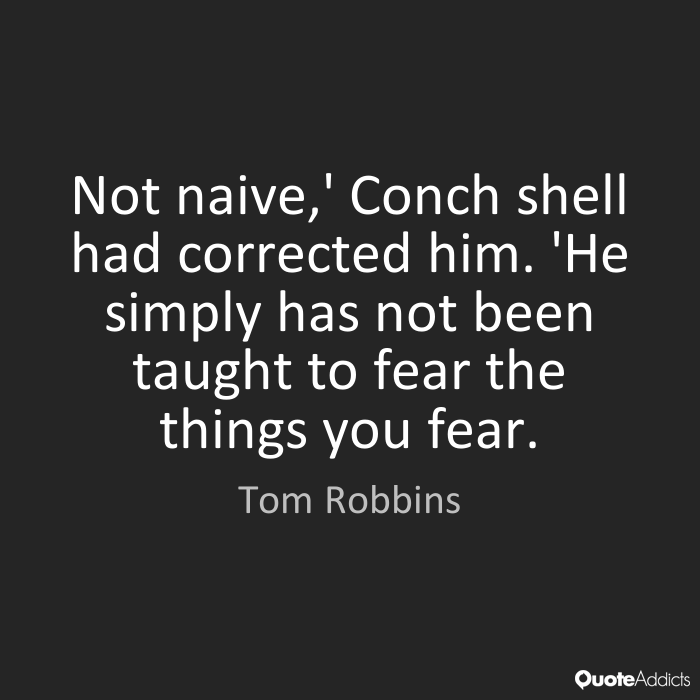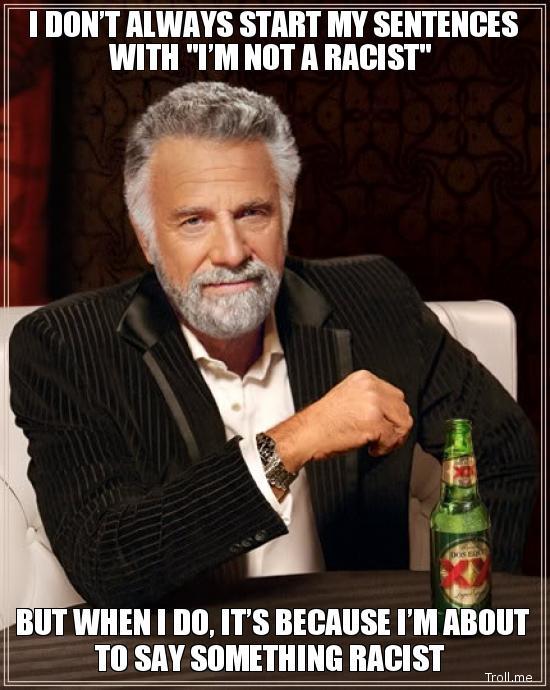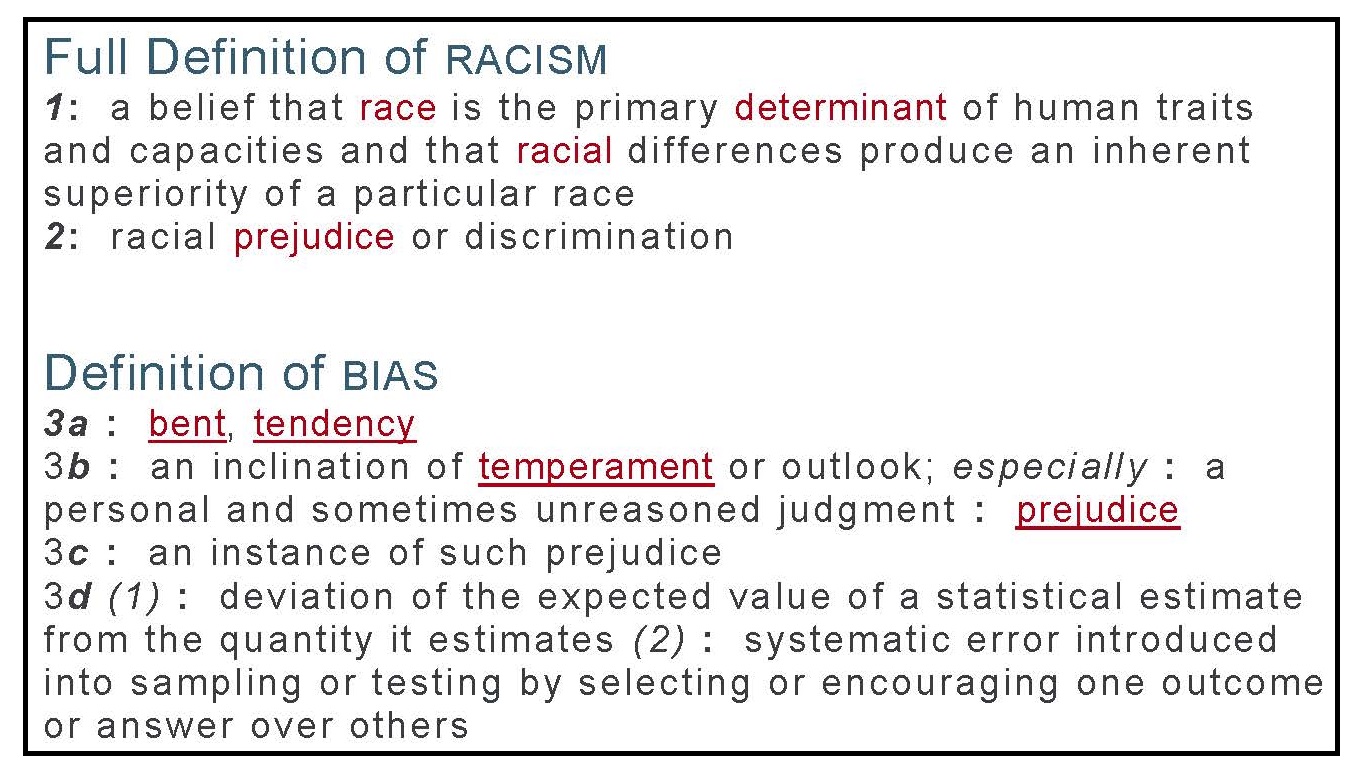The first conversation I ever had with a black person, was at my college orientation. I was 18. Black people didn’t live where I lived, they weren’t in the books that I read or the shows that I watched unless they were the thugs getting arrested. With the exception of slaves, Harriet Tubman and MLK Jr, they weren’t part of my education. For the first 18 years of my life, black people, (specifically men) were like the mountain lions in the forest around me. I’d never met one, but I knew they were there, and they scared me.
Here’s the thing, I don’t remember ever encountering or spending time with an overtly racist person. I can’t recall ever being told by a teacher or parent or friend that black men were dangerous. I didn’t personally know anybody who had been victimized by a black man. So why was I afraid? Where did I learn to fear black men?
I hate to name something as banal as ‘society,’ but what else is there? I learned that fear from watching the nightly news with my parents. I learned that fear listening to talk radio hosts pontificating on the evils of gangs and the black men in them who killed each other and anybody else who happened to get in the way. Now I’m not saying that I am pro-gang and think that gang members and their violence should be talked about in loving terms. Far from it. The thing is, I never heard anybody talk about the black community positively. I learned fear because the black narrative was predominantly, at times exclusively, negative, and I had nothing in my real life to refute it. I had been conditioned to fear black men and think poorly of black people in general. I have no idea about anybody else from that little community, but that was the state in which I left.
Subconsciously, I was aware of the conditioning and never fully bought into in. I’d love to give myself credit and say that I was a socially enlightened being from the get-go and this was a conscious choice, but that would be a bald-faced lie. It’s only in retrospect that I can look back and see that I fought against this conditioning. I had no idea what I was fighting, but I knew that I didn’t want to believe that an entire race of people could be bad or lazy or dangerous or any of the other descriptors used. I was well aware that not all white people were good. Some were great, some were crappy and some fell in between. The same had to exist in the black community. So when I met and talked with my first black person in college, I latched on to her and she became my first college friend. I LOVED that she dispelled ever stereotype that had been planted in my brain as fact. We talked about honor classes and stressed out over grades. When she talked about her dad, I heard, for probably the first time, about a successful and thriving black man.
That summer I worked for the Colorado Shakespeare Festival where I met and worked closely with a black actor. He was incredibly talented, kind, funny, generous with his time, and when the shit hit the fan toward the end of the summer, he had my back. To this day, I have nothing but respect for him and his work and I would work with him again in a heartbeat. I also met a woman who would later become one of the hardest and most demanding professors that I ever had. Yet despite this, she was able to instill a life-long love of Shakespeare in me and I eventually overcame my awe of her enough to become friends. Once more, nothing I was encountering in real life matched the narrative that I had been fed growing up.
Yet when I looked around, the same narrative continued. Only this time, I had something to refute it. Something to hold onto in order to fight the conditioning and keep it from settling back in. Eventually I stopped watching the news, and talk radio was definitely out. I didn’t want to live in that world anymore. So I didn’t, and I naively thought that I had outgrown . . . outwitted . . . out maneuvered . . . I don’t know exactly what to call it, but I felt as though I had moved beyond my biased conditioning. Ta-da! Pat myself on the back.
Jump forward to me living Los Angeles, and it became abundantly clear that I hadn’t. No ta-da, no pat on the back. While Denver certainly had much more diversity than the tiny mountain town where I grew up, it is lily-white in comparison to Los Angeles. I have never seen so many cultures in one place in my entire life. For the record, I love it! I can’t imagine living anywhere else.
However, in this culture shock, albeit a good culture shock, my conditioning resurfaced. If I was out walking my dogs and saw a black man, I would get nervous. It could be the middle of the damn day and the appearance of a black man that I didn’t know would make me nervous. I didn’t even realize it at first. It was so rooted in my subconscious that a black men equaled danger, I didn’t even think about it, I just felt it down to my bones.
It finally hit me that this was occurring, when one of these so-called dangerous black men turned out to be a coworker. I hadn’t recognized him at first. I had prepped my purse in order to fend off his attack, and this made me feel so guilty, I almost apologized to him. I almost apologized for lumping him into the ‘dangerous’ black man category, instead of the ‘friend-of-mine-and-therefore-friendly’ black man category. That was my light bulb moment. My conditioning was still firmly in place. I had merely made exceptions to the rule to accommodate my friends and coworkers. Take away that exception and all that remained was fear.
I don’t like to admit this, in fact this is the first time that I ever have, because it makes me feel like I am a racist. It makes me feel like I’m a huge racist, and I don’t like that feeling. In all honesty, I would get angry that I felt like a racist. Angry at who, I have no idea. I would hazard to guess, that I am not the only one who has gone through these emotions. In fact, I’m pretty sure this is where that whole white-guilt thing comes from. The guilt comes up, we bury down the feelings that caused it, ignore them and reassure ourselves that we are good people. For the next couple of days, we might even go out of our way to be nice to every black person we see, just to reassure ourselves that we aren’t racist. I know I’ve done this. I’ve stayed longer to hold a door open, or let someone cut in line at the grocery store specifically to reassure myself that I was not a racist. But here’s the thing, all of that is pointless because it doesn’t accomplish or change anything. The underlying thought-process that caused the first behavior is still there. And here’s the kicker, I’m not a racist, so why was I spending so much time concerning myself about it? Because I was confusing being a racist, with having a bias. There’s a difference, and yes it can be a fine line, but there is a difference. Since I’m a massive word-nerd, I looked up the definitions from Merriam Webster.
I don’t believe that race has anything to do with human traits and capabilities, or that one race is superior over another. I never have and never will. That is the entire definition! If I disagree with the entire definition, then it is clearly not describing me. However, the third definition of the word bias is another story. ‘Inclination of temperament or outlook’ and ‘unreasoned judgement’ sound pretty spot on. I have no logical reason to judge black men poorly, other than what was fed to me through society. I think we as a people, need to step back and really examine our biases. Are all people on welfare lazy drug-addicts, or is that merely what we’ve been led to believe by people who oppose the program? I can tell you that when I was on welfare, I was neither lazy, nor on drugs. Yet that was a bias that definitely took up space in my head until I stepped into that world myself.
Here’s the thing, having biases doesn’t make us bad people. It’s human nature, everyone has biases that play into everyday of their lives. There’s a reason that I bought a Chevy instead of a Ford – I have a distinct bias against Fords. My grandfather worked for Chevy, and so did my aunt. Therefore they MUST be better cars. Does that make any sense? No. Yet I drove a Chevy into work this morning. In the grand scheme of things, this bias is inconsequential. So I’m going to ignore it and probably go on avoiding Fords for the rest of my life and nobody will care one way or the other.
However, the bias against the black community, and black men specifically, is a problem and has been around since the founding of this country. In the grand scheme of things, this is a huge problem and it effects thousands of people all over the US who are spending their lives in jail and getting killed. I’m not saying that there aren’t black men that deserve to be in jail, I’m sure there are. What I’m saying, is that when you look for trouble and the majority of the attention is focused on one group of people, you’re going to find trouble. Not because it only exists there, but because that’s where you are looking. And if you don’t see any, yet keep looking, seemingly innocuous behavior will begin to look suspect. I’ve heard my parent friends talk about sneaking up on their kids to catch them in one act of wrong-doing or another, only to be surprised that what seemed nefarious was actually innocent. If you expect trouble, you will eventually get trouble whether it’s real or manufactured.
A recent study done by Yale showed that the bias against black males starts as early as kindergarten. They had teachers watch a video to look for signs of challenging behavior among four children – one black girl, one black boy, one white girl, and one white boy. Despite the fact that none of the children were exhibiting challenging behavior, the teachers reported that the black boy needed the more attention then anybody else. After reading that, it makes a little more sense why for many young black men, school is a direct pipeline to jail. Maybe it’s just me, but if I get wrongly accused of misbehaving enough, I start misbehaving. If I’m going to be accused of it anyway, I might as well get the pleasure from doing the misdeed.
I’m sure there are people who don’t have this bias, and I applaud them. But with the history of this country, and if we’re all being completely honest with ourselves, I would guess that number is low. The good news, is that if we can acknowledge that this bias exists, if we can swallow our frickin’ pride and admit that we do this, we can reverse it. I really hope the teachers that participated in that study are now looking at their classrooms with a different perspective. It won’t happen overnight, but we can retrain our brains to come up with new conclusions, and expect different outcomes.
It took me about four years. Now, when I’m out walking my dogs and I see a black man, my conditioning goes to ‘dude-I-don’t-know’ instead of ‘dangerous-black-man.’ If it’s night, that conditioning goes to ‘potential rapist,’ but to be fair that’s my conditioned reaction for any man I see at night regardless of race. When outside by myself at night, all men make me equally nervous. Which is an issue all by itself but as long as the rape culture persists it’s warranted. Don’t get me wrong, I have every faith that my dogs would defend me if I was attacked, however, they are puggles, not German Shepherds. I’m fairly certain that the worst they could do is give someone a permanent limp. So I keep my eyes open. However, for the first time in my life, my heart doesn’t speed up more at the sight of a black man then it does at the sight of a white man. And I consider that progress.





